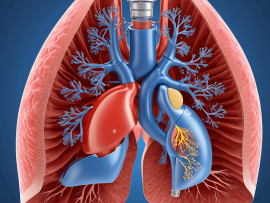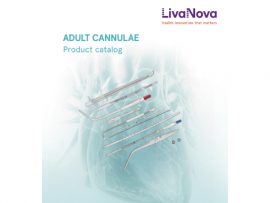Abstract Background Patient safety science and debriefing approaches have historically tended to focus most heavily on Safety-I or “why things go wrong” and learning from unfavorable performance, root cause of..
Read MoreAbstract Background Acute lower limb ischemia is a major complication of peripheral venoarterial ECMO, significantly impacting patient outcomes and survival rates. Traditional methods for assessing limb perfusion, such as physical..
Read MoreAbstract Objective: A standardized multifaceted approach to follow-up is crucial for monitoring neurodevelopment in neonates who undergo extracorporeal membrane oxygenation (ECMO). The Pittsburgh Index for Pre-ECMO Risk (PIPER+) score, which..
Read MoreAbstract In recent decades, multiple efforts have been made to reduce population exposure to cigarettes, given that smoking is responsible for thousands of deaths annually. These actions have been effective,..
Read MoreAbstract Objective Postoperative delirium remains a common complication after cardiac surgery in high-risk patients and has been associated with prolonged intensive care unit length of stay, overall morbidity, and mortality...
Read MoreAbstract Background Veno-Arterial Extracorporeal Life Support (VA ECMO) is a critical intervention for patients with cardiogenic shock, serving as bridge to recovery, transplantation, or long-term therapies. The complexity of VA..
Read MoreAbstract Objective Hemoconcentration and cell saver use are blood conservation techniques that are often used in cardiac surgery to salvage the patient's own blood to reduce autologous transfusion. The purpose..
Read MoreAbstract IN PATIENTS UNDERGOING bilateral lung transplant (BLT), the use of planned intra- and postoperative venoarterial extracorporeal membrane oxygenation (VA-ECMO) is increasing. It has become the standard practice in many..
Read MoreAbstract Background: Postoperative Acute kidney injury (AKI) is a significant concern for cardiac surgery patients with chronic kidney disease (CKD). Effective pharmacological interventions to mitigate these risks are urgently needed...
Read MoreAbstract Fever following decannulation from extracorporeal membrane oxygenation (ECMO) poses diagnostic challenges. While infectious causes and thrombosis are typically considered, rare etiologies may be overlooked. We report the case of..
Read MoreAbstract Introduction: Research in mission-critical professions, including emergency medicine and surgery, has shown that stress can distort perceptual processes which may degrade performance at critical times. No comparable research has..
Read MoreAbstract Objectives The effect of perioperative hyperoxia on microcirculation after cardiac surgery remains inconclusive. We evaluated the relationship between intraoperative fractional inspired oxygen and microcirculation after off-pump coronary artery bypass..
Read MoreAbstract Medical devices used in contact with blood trigger coagulation and activate platelets leading to thrombotic complications. To prevent these effects, systemic anticoagulants and antiplatelet agents are typically prescribed, but..
Read MoreAbstract Objective Extracorporeal cardiopulmonary resuscitation (ECPR) is increasingly used to rescue patients in cardiac arrest. However, minimal data guide candidacy decisions, and centers must develop their own initiation criteria, raising..
Read MoreAbstract Aim Prehospital extracorporeal cardiopulmonary resuscitation (ECPR) has been proposed to reduce delays in ECPR delivery in refractory out-of-hospital cardiac arrests (OHCA) and improve outcomes. Our aim was to synthesize..
Read MoreAbstract Purpose: The evidence supporting the benefit on clinical outcomes of prone positioning during veno-venous extracorporeal membrane oxygenation (V-V ECMO) for acute hypoxemic respiratory failure remains inconclusive. We aimed to..
Read MoreAbstract EXTRACORPOREAL MEMBRANE OXYGENATION (ECMO) is a potentially life-saving intervention often used in critically ill patients with severe respiratory or cardiac failure unresponsive to conventional treatments. As the prevalence of..
Read MoreAbstract Background There are limited data on the causes of death in patients undergoing extracorporeal cardiopulmonary resuscitation (ECPR). This study aimed to analyse the causes of death among patients who..
Read MoreAbstract Background: Patients who undergo extracorporeal cardiopulmonary resuscitation (ECPR) are at risk of left ventricular distention and complications. There is emerging evidence that concurrent mechanical left ventricular (LV) unloading (e.g...
Read MoreAbstract Background Anticoagulation in pediatric extracorporeal membrane oxygenation (ECMO) presents unique challenges due to developmental hemostasis, coagulation factor production, and response to anticoagulants. This process requires close monitoring to prevent..
Read MoreAbstract Background Simulation is increasingly utilized in the clinical training of healthcare professionals. Many perfusion programs in the United States use simulation to teach students both technical skills and effective..
Read MoreAbstract Acute poisoning may lead to life-threatening conditions that require advanced life support, such as extracorporeal membrane oxygenation (ECMO). Data about the use of ECMO in intoxications and overdose are..
Read MoreAbstract Background Outcomes in cardiac surgery are influenced by surgical priority, with higher mortality in emergency cases. Whether this applies to postcardiotomy venoarterial (VA) extracorporeal membrane oxygenation (ECMO) remains unknown...
Read MoreAbstract Aims This study aims to identify distinct clusters of patients undergoing coronary artery bypass grafting (CABG) based on demographic, clinical, and autonomic function characteristics and to validate these clusters...
Read MoreAbstract The use of extracorporeal membrane oxygenation has been increasing over time, in part due to the COVID-19 pandemic. Whilst lifesaving, complications that must be managed are also associated with..
Read MoreAbstract The autonomic nervous system is critical for regulating cardiovascular physiology. The neurocardiac axis encompasses multiple levels of control, including the motor circuits of the sympathetic and parasympathetic nervous systems,..
Read MoreAbstract Background Antithrombin signalling may exert an anti-inflammatory effect; therefore we hypothesised that individuals with inherited antithrombin deficiency (ATD) may have an altered inflammatory state. Aims To assess the inflammatory..
Read MoreAbstract Background The effect of Friday the 13th and Full Moons on cardiac transplantation is unknown. We investigated the impact of these superstitious events on recipient and donor qualities, complications,..
Read MoreAbstract Objective: We aimed to characterize the impact of body mass index (BMI) on stroke in patients receiving extracorporeal cardiopulmonary resuscitation (ECPR). Methods: We queried the Extracorporeal Life Support Organization registry..
Read MoreAbstract Objective To describe the occurrence of cerebral desaturation (≥10% decrease or <50% in regional cerebral oxygen saturation [rSO₂]), deep anesthetic states (processed electroencephalography patient state index [PSI] <25), and..
Read More


















